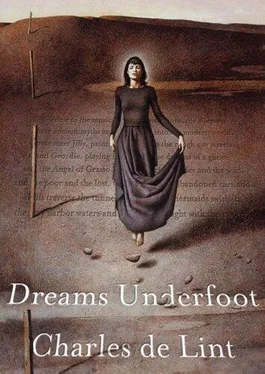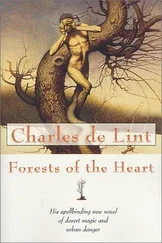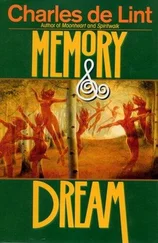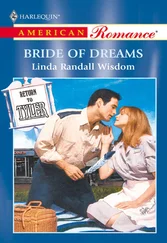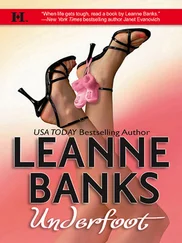“But the kids are worth it,” he said finally.
“I don’t see you teaching children.”
“There’s just not many parents that can afford a harp for their prodigies.”
“But still ...”
“Still,” he agreed. “You’re perfectly right. I don’t like dealing with their parents; never did. When I see children put into little boxes, their enthusiasms stifled ... Everything gets regimented into what’s proper and what’s not, into recitals and passing examinations instead of just playing—” he began to mimic a hoitytoity voice “—I don’t care if you want to play in a rock band, you’ll learn what I tell you to learn ....”
His voice trailed off. In the back of his eyes, a dark light gleamed—not quite anger, more frustration.
“It makes you want to give them a good whack,” Meran said. “Exactly. So did you?”
Meran shook her head. “It wasn’t like that, but it was almost as bad. No, maybe it was worse.”
She told her husband about what Lesli’s mother had asked of her, handing over the English essay when she was done so that he could read it for himself.
“This is quite good, isn’t it?” he said when he reached the end. Meran nodded. “But how can I tell Lesli that none of it’s true when I know it is?”
“You can’t.”
Cerin laid the essay down on the windowsill and looked out at the oaks again. The twilight had crept up on the garden while they were talking. All the trees wore thick mantles of shadow now—poor recompense for the glorious cloaks of leaves that the season had stolen from them over the past few weeks. At the base of one fat trunk, the little monkeymen were roasting skewers of mushrooms and acorns over a small, almost smokeless fire.
“What about Anna Batterberry herself?” he asked. “Does she remember anything?”
Meran shook her head. “I don’t think she even realizes that we’ve met before, that she changed but we never did. She’s like most people; if it doesn’t make sense, she’d rather convince herself that it simply never happened.”
Cerin turned from the window to regard his wife.
“Perhaps the solution would be to remind her, then,” he said. “I don’t think that’s such a good idea.
It’d probably do more harm than good. She’s just not the right sort of person ...”
Meran sighed again.
“But she could have been,” Cerin said.
“Oh yes,” Meran said, remembering. “She could have been. But it’s too late for her now.”
Cerin shook his head. “It’s never too late.”
From Lesli’s diary, addendum to the entry dated October 12th:
I hate living in this house! I just hate it! How could she do this to me? It’s bad enough that she never lets me so much as breathe without standing there behind me to determine that I’m not making a vulgar display of myself in the process, but this really isn’t fair.
I suppose you’re wondering what I’m talking about. Well, remember that essay I did on ethnic minorities for Mr. Allen? Mom got her hands on it and it’s convinced her that I’ve turned into a Satanworshipping drug fiend. The worst thing is that she gave it to Meran and now Meran’s supposed to “have a talk with me to set me straight” on Thursday.
I just hate this. She had no right to do that. And how am I supposed to go to my lesson now? It’s so embarrassing. Not to mention disappointing. I thought Meran would understand. I never thought she’d take Mom’s side—not on something like this.
Meran’s always seemed so special. It’s not just that she wears all those funky clothes and doesn’t talk down to me and looks just like one of those PreRaphaelite women, except that she’s got those really neat green streaks in her hair. She’s just a great person. She makes playing music seem so effortlessly magical and she’s got all these really great stories about the origins of the tunes. When she talks about things like where “The Gold Ring” came from, it’s like she really believes it was the faeries that gave that piper the tune in exchange for the lost ring he returned to them. The way she tells it, it’s like she was there when it happened.
I feel like I’ve always known her. From the first time I saw her, I felt like I was meeting an old friend.
Sometimes I think that she’s magic herself—a kind of oaktree faerie princess who’s just spending a few years living in the Fields We Know before she goes back home to the magic place where she really lives.
Why would someone like that involve themselves in my mother’s crusade against Faerie?
I guess I was just being naive. She’s probably no different from Mom or Mr. Allen and everybody else who doesn’t believe. Well, I’m not going to any more stupid flute lessons, that’s for sure.
I hate living here. Anything’d be better.
Oh, why couldn’t I just have been stolen by the faeries when I was a baby? Then I’d be there and there’d just be some changeling living here in my place. Mom could turn it into a good little robot instead.
Because that’s all she wants. She doesn’t want a daughter who can think on her own, but a boring, closedminded junior model of herself. She should have gotten a dog instead of having a kid. Dogs are easy to train and they like being led around on a leash.
I wish Granny Nell was still alive. She would never, ever have tried to tell me that I had to grow up and stop imagining things. Everything seemed magic when she was around. It was like she was magic—just like Meran. Sometimes when Meran’s playing her flute, I almost feel as though Granny Nell’s sitting there with us, just listening to the music with that sad wise smile of hers.
I know I was only five when she died, but lots of the time she seems more real to me than any of my relatives that are still alive. If she was still alive, I could be living with her right now and everything’d be really great.
Jeez, I miss her.
Anna Batterberry was in an anxious state when she pulled up in front of the Kelledy house on McKennitt Street. She checked the street number that hung beside the wroughtiron gate where the walkway met the sidewalk and compared it against the address she’d hurriedly scribbled down on a scrap of paper before leaving home. When she was sure that they were the same, she slipped out of the car and approached the gate.
Walking up to the house, the sound of her heels was loud on the walkway’s flagstones. She frowned at the thick carpet of fallen oak leaves that covered the lawn. The Kelledys had better hurry in cleaning them up, she thought. The city work crews would only be collecting leaves for one more week and they had to be neatly bagged and sitting at the curb for them to do so. It was a shame that such a pretty estate wasn’t treated better.
When she reached the porch, she spent a disorienting moment trying to find a doorbell, then realized that there was only the small brass door knocker in the middle of the door. It was shaped like a Cornish piskie.
The sight of it gave her a queer feeling. Where had she seen that before? In one of Lesli’s books, she supposed.
Lesli.
At the thought of her daughter, she quickly reached for the knocker, but the door swung open before she could use it. Lesli’s flute teacher stood in the open doorway and regarded her with a puzzled look.
“Anna,” Meran said, her voice betraying her surprise. “Whatever are you—”
“It’s Lesli,” Anna said, interrupting. “She’s ... she ...”
Her voice trailed off as what she could see of the house’s interior behind Meran registered. A strange dissonance built up in her mind at the sight of the long hallway, paneled in dark wood, the thick Oriental carpet on the hardwood floor, the old photographs and prints that hung from the walls. It was when she focused on the burnished metal umbrella stand, which was, itself, in the shape of a partiallyopened umbrella, and the sidetable on which stood a castiron, grinning gargoyle bereft of its roof gutter home, that the curious sense of familiarity she felt delved deep into the secret recesses of her mind and connected with a swell of longforgotten memories.
Читать дальше
